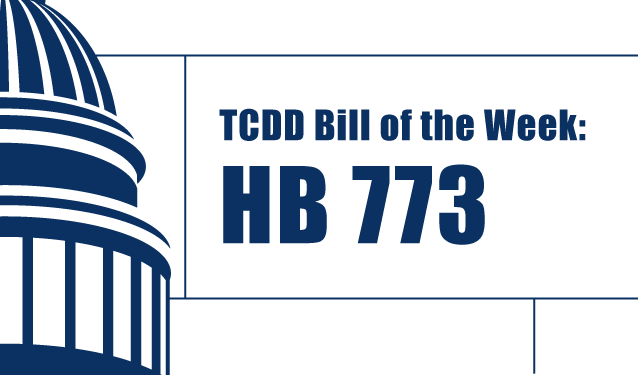HB 773
HB 773

For this weekly feature, we profile a noteworthy bill that is going through the legislative process. The bill may relate directly to TCDD’s Public Policy Priorities or another disability-related issue.
Table of Contents
Bill: House Bill (HB) 773, which would ban school districts and open-enrollment charter schools from disciplining students by sending them home early for actions that do not violate student codes of conduct.
Bill author: Rep. Alma Allen, House District 131 (Houston)
Share this bill
We’ve created a Bill of the Week one-pager (PDF) for HB 773. This is a simplified explanation of the bill that you can share with your representative and personal network.
Background
In a January 2022 report, the National Disability Rights Network described how schools across the country are illegally removing students with disabilities from the classroom. Schools conduct this practice, known as “informal removals,” in a manner “off the books” and absent from data reporting, according to the report.
Similarly, Texas Appleseed has described these undocumented out-of-school suspensions as a form of “shadow discipline.” A survey conducted by the group found that 48% of families who experienced informal removals reported that they happened four or more times, demonstrating how often the practice occurs.
Under the Individuals with Disabilities Education Act (IDEA), students with disabilities are required to receive a free appropriate public education along with behavioral services if applicable. This ensures students with disabilities receive at least the same education as other students and are taught with their peers to the maximum extent. Advocates argue this cannot happen when a student is frequently sent home early.
What does the bill do?
HB 773 would amend the education code to ban school districts or open-enrollment charter schools from sending a student home before the end of a school day after the school contacts the student’s parent. Specifically, the bill would ban such release if:
- it is a discipline management technique, or
- it is a reaction to the student’s behavior that impedes the student’s ability to learn but does not violate the student code of conduct or require disciplinary action.
The bill allows for a student’s release before the end of the school day if the student is suspended or expelled.
If passed, HB 773 would take effect on Sept. 1, 2023, or immediately if it received an affirmative vote of two-thirds in both the House and the Senate. The bill would apply beginning in the 2023-2024 school year.


Statement from Rep. Alma Allen, bill author:
“[HB 773] will reduce negative family impact and leave schools to look at the underlying need for students, [and] to provide more effective services or support that keeps kids in school and learning.”
Where is the bill in the process?
On April 3, 2023, HB 773 received a public hearing before the House Select Committee on Youth Health and Safety. You can watch the discussion on the bill here, beginning at the 13:55 mark.
On April 13, the bill was favorably reported on a vote of 6-1. It now heads to the Calendars Committee, where it will await scheduling for consideration by the full Texas House.
Who supports the bill and why?
The following comments were given as testimony at a hearing on April 3, 2023, on HB 773:
- Coalition of Texans with Disabilities: Jolene Sanders-Foster, advocacy director for the Coalition of Texans with Disabilities, testified in favor of the bill. She highlighted the concerning pattern in schools where students, typically students with disabilities or students of color, are sent home early for actions that do not violate the code of conduct. She explained how this practice can adversely impact the student’s academic and social development, as well as reinforce negative behavioral patterns. Sanders-Foster suggested that, since the Legislature took steps a few years ago to ban the use of suspensions against students in pre-kindergarten through second grade, some schools are using this undocumented practice as a replacement. To close, she stated, “Because it’s not documented, these parents are getting truancy notices, and they are unable to defend themselves because they were not the ones who initiated leaving their kids out of school.”
- Autism Society of Texas: Jacquie Benestante, executive director at the Autism Society of Texas, testified in support of the bill. Benestante shared the story of an individual, a single mother of a child with autism who was called to pick up her child from elementary school so frequently that she had “lost her job, … could not make rent, and was being threatened with eviction.” Benestante highlighted how the early pickups particularly impact students with autism, stating, “This happens so much to families of kids with autism, it’s shocking how much it happens.”
The following groups also registered their support for HB 773 but provided no testimony: The Arc of Texas, Disability Rights Texas, Intercultural Development Research Association, Texas AFL-CIO, and Texas Center for Justice and Equity.
Who opposes the bill and why?
Texas Education 911 registered opposition to the bill but provided no testimony.
Additional testimony
The following comments were provided on HB 773 at the April 3 hearing:
- Texas Homeschool Coalition: Anita Scott, representing the Texas Homeschool Coalition, testified on the bill. She thanked Rep. Allen’s office for working with her organization to clarify the language and stated that HB 773 “ensures that schools are not overreacting and unduly penalizing a student by sending the student home for reasons that do not reach a level of behavior that would necessitate such discipline measures while also protecting parental rights.”
- TCDD: Sabrina Gonzalez Saucedo, a public policy analyst for TCDD, provided written testimony on the bill. She wrote that, “if [a] student’s behavior requires ten consecutive or cumulative days of exclusionary discipline, IDEA requires schools to conduct a Manifestation Determination Review (MDR) to determine whether the behavior is a manifestation of the student’s disability.” Gonzalez Saucedo continued, “Schools must also determine whether the student requires additional assessments and behavior supports prior to being disciplined, and may put a ‘Behavior Intervention Plan’ (BIP) into place to help educators find positive ways to address problem behavior. If a BIP is created, educators are supposed to look to the plan before using another type of discipline.” But since informal parent pickups are not recorded as formal out-of-school-suspensions, schools are not conducting MDRs. Nor are they “asking the important questions to figure out the underlying needs of students and their families, leaving students at risk for more punishments, missed classroom and socialization time, and poor academic outcomes.”
Additional information
TCDD has adopted the following language as one of its 2023 Public Policy Priorities:
Early Pickups: Require documentation for all school-initiated early pickups and shortened school days for students with disabilities, and eliminate the prevalence of unreported early pickups across the state.
The Governor’s Committee on People with Disabilities included the following in its 2024-2025 Policy Recommendations Report (PDF, 75 pages, 674 KB) to the 88th Texas Legislature:
Recommendation 3.10: Amend Texas Education Code Sec.25.0875 to clarify the prohibited use of informal, undocumented suspensions and certain releases of students with disabilities to parents after school-initiated communication.
How much will the bill cost?
The Legislative Budget Board found HB 773 will not increase the state budget.
Is there a Senate companion to the bill?
There is no Senate companion to HB 773.
Stay informed
For the latest information about where HB 773 is in the process, follow the bill on the Texas Legislature Online. To receive future legislative updates from TCDD, follow us on Twitter, Facebook, LinkedIn, or Instagram.
Bill of the Week Updates
Here is an update on previous TCDD Bills of the Week for the 88th legislative session.
Senate Bill (SB) 477 was passed out of the Senate on April 12 and has been referred to the House Elections Committee. The bill would provide greater accommodations for voters with disabilities.
HB 54 has been scheduled for consideration by the full House on Monday, April 17. The bill would increase the monthly personal needs allowance for residents of long-term care facilities.
The following bills have been favorably reported out of committee and await scheduling for consideration on the House’s Local and Consent Calendar:
- HB 109, regarding health benefit coverage for hearing aids
- HB 195, regarding emergency preparedness for students with disabilities
- HB 459, regarding a ban on restraint and chemical irritants against students age 10 and younger
SB 133, the Senate companion to HB 459, passed out of that body on April 11 and has been referred to the House Select Committee on Youth Health and Safety.
